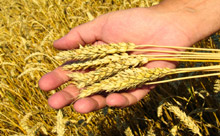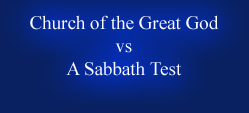

Jesus Condoned It


But the house of Israel rebelled against me in the wilderness:
they walked not in my statutes, and they despised my judgments,
which if a man do, he shall even live in them; and my sabbaths they greatly
polluted: then I said, I would pour out my fury upon them in
the wilderness, to consume them.
Ezekiel 20:13
John Ritenbaugh:
Matthew 12:1-8
At that time Jesus went on the sabbath day through the corn; and his disciples were an hungered, and began to pluck the ears of corn, and to eat. But when the Pharisees saw it, they said unto him, Behold, your disciples do that which is not lawful to do upon the sabbath day. But he said unto them, Have you not read what David did when he was an hungered, and they that were with him; How he entered into the house of God, and did eat the showbread which was not lawful for him to eat, neither for them which were with him, but only for the priests? Or have you not read in the law how that on the sabbath days the priests in the temple profane the sabbath, and are blameless? But I say unto you, That in this place [meaning Himself] is one greater than the temple. But if you had known what this means, I will have mercy and not sacrifice, you would not have condemned the guiltless. For the Son of man is Lord even of the sabbath day.
"Now, right in this context, did not Jesus permit His disciples to go through the field to pick and perform the simple preparations required in order to feed hungry men on the Sabbath? I am sure that this did not occur every Sabbath, but on this unusual occasion it did, and He met the situation in the manner described. Mercy, brethren, is greater than the sacrifice of going hungry."
"What we are seeing then are reasons why the work performed is what matters. It carries the greatest weight in making the judgment. What I want us to see is that Jesus is clearly showing that even the law of God contains room for interpretations, because the "black and white" appearing law does not cover greater needs in every situation that might pop up in six thousand years of man's history."
Our Response:
Contrary to what Mr. Ritenbaugh is implying, what happened to the disciples occurred only once in their lifetime. There isn't a hint in scripture that suggests otherwise. Despite this fact, this teacher wants you to believe that this may have been an ongoing practice of the Messiah and His disciples.
Furthermore, while John Ritenbaugh employs the act of the disciples picking grain as justifiction for God's people today to dine out on the Sabbath the facts declare otherwise. This is borne out in Jesus' invocation of David and the shewbread.
A Lesson From David
The actual story of David and the Shewbread provides some very keen insight into what was really taking place when Jesus' disciples picked grain on the Sabbath. Furthermore, it makes a powerful statement regarding the issue of dining out on holy time. Consider the dynamics taking place during this event.
When David ate the showbread he didn’t simply take it and start eating. He first approached the priest and asked for permission to do so—and he had a very good reason for asking. The scriptures tell us that at this time David was being pursued by King Saul who wanted to kill him. His flight required him and his men to hide out in order to avoid capture and certain execution. In all likelihood, their escape was so swift that they didn’t have time to take provisions with them. Some commentaries suggest that they may have gone 3 days without food when David finally sought out the priest for help. Jamison, Fausset and Brown’s commentary described David’s plight as “an emergency.” They would go on to write:
“David and his attendants seem to have been lurking in some of the adjoining caves, to elude pursuit, and to have been, consequently, reduced to great extremities of hunger.”
In short, they were famished. This was not a simple case of the “munchies.” Nor were they looking for a nice place to fellowship. Their need was REAL. And their situation was desperate.
However, even then David sought the permission of the priest before taking the showbread. And although his need was truly GREAT, Ahimelech the priest still inquired of God as to whether he could give David the food. The scriptures tell us that God showed mercy to David and consented. JFB put it this way.
“A dispensation to use the hallowed bread was specially granted by God Himself.”
This now bring us to an important question. Why would Jesus invoke the story of David at this time if it didn’t parallel, to some degree, what was taking place with the disciples? After all if the need of the disciples wasn't comparable to that of David and his men the analogy wouldn't work. In other words if what the disciples did was simply an attempt to satisfy the natural hunger that preceeds a meal then their reason for plucking the grain would have been driven by convenience while David's reason was driven by desperation. At this point it is interesting that the word used to describe the disciples hunger (Mt. 12:1) was the same used to describe the hunger experienced by David (v. 3). It was also the same word used to describe the Messiah's condition when he fasted for forty days and forty nights in the wilderness (Mt. 4:2)
Based on Jesus' invocation of the story of David and the shewbread, it is reasonable to conclude that what the disciples were experiencing was truly unique. This was not a typical Sabbath in which these men were simply acquiring a normal meal. These men were were genuinely hungry, perhaps even famished. You don’t know why, but like David they must have had a very good reason for having not eaten. As a result they inquired of the Messiah to see if they could gather a small amount of grain to eat. Jesus consented.
The story suggests that Jesus was making two point by using David’s example when defending His men. The first was that the Pharisees were quick to judge the disciples without knowing all the facts. By invoking the story of David Jesus put the situation into perspective. In other words, there is more here than meets the eye.
The second point Jesus was making is truly extraordinary. He was telling the Pharisees that the same God who gave David permission to eat the shewbread gave the disciples permission to eat the grain.
Jesus was that God.
This is why He said, “For the Son of man is Lord even of the Sabbath day”
A Final Thought
The bottom line is this. God's judgment of David as well as His judgment of the apostles was based on a unique circumstance at a unique time. For Mr. Ritenbaugh to hold this example as proof that God’s people may now make plans to pay Sabbath-breakers to prepare their meals on holy time and also be held guiltless is disgraceful. In a very real sense such a belief turns the grace of God into license. In other words, it rejects the true meaning of the words "I desire mercy and not sacrifice," and represents them to mean "If you can acquire your Sabbath food once, because of a genuine need, then I can declare that the normal hunger I feel prior to every meal is no different.